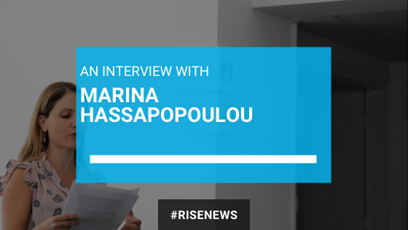21 October. 2019

An interview with Marina Hassapopoulou
Marina Hassapopoulou is Assistant Professor in the Department of Cinema Studies and an NYU Humanities Faculty Fellow for this academic year. She has published articles and book chapters on topics including interactive cinema, digital spectatorship, border cinemas, experimental and Hollywood production, fan studies, representations of Hellenism in U.S. media, hybrid pedagogy, expanded television, and digital humanities. She teaches film, theory/philosophy, digital media, European cinema, digital humanities, cultural studies and theory-practice courses.
We were delighted to have Marina give a presentation on “Artificial Intelligence, the Popular Imaginary, and New Inequalities”, a talk that aimed to approach A.I., machine learning, and algorithmic culture from an Arts and Humanities-oriented perspective in order to propose a more interdisciplinary accompaniment to techno-scientific research.
Marina was kind enough to participate in our blog by answering our questions and giving us some further insight as to the main issues such a project is facing, future plans and steps as well as predictions regarding spectator experience in the next decade.
What problem are you trying to solve?
The main issue with every so-called "neutral" technology is the human bias that is embedded in it from its inception. As long as technology is programmed and used by humans, it is bound to contain human prejudice and to replicate existing socioeconomic inequalities. We can combat this by coming up with interdisciplinary protocols for ethical uses of technology, including tackling issues regarding the distribution of labor and the environmental costs. This is, of course, easier to envision in theory than in practice, but there have already been several productive initiatives that bring together experts from various fields to critically discuss technology beyond its technical and corporate aspects.

What are your next steps for this project? Are you planning any further experiments?
Some of my ongoing pedagogical projects include experimenting with multimedia forms of writing in order to disseminate scholarship in more ways than through print; this is also a way of reaching a broader audience beyond academics. Furthermore, my students and I often experiment with "hacking" existing tools and platforms, such as social media, to repurpose them and come up with alternative and/or subversive uses for them.
Recently, I have been involved in some promising initiatives that aim to propose new ethical protocols for using emerging technologies (although not "new" conceptually or historically!), such as virtual/augmented reality and artificial intelligence. Coming up with uniform and global principles is very challenging, and this might not necessarily be the right solution, depending on cultural and socio-economic contexts.
What do you envision will be the biggest shift in spectators’ experience in the next 10 years?
In 10 years, if our planet is still alive, I would like to hope that spectators' experience will be more diverse and interactive in meaningful ways.
Another possibility is that films and other media might be consumed internally, inside our minds, rather than externally -- a scary thought, but the way that biometrics and other invasive technologies are going, this could be possible and might not necessarily only have negative outcomes. Even the fact that tech prosthetics such as VR gear try to become lighter and more transparent indicates a certain desire to further merge our bodies with technology. As a huge sci-fi fan, I can't help but think of films like Minority Report, Abre los ojos/ Vanilla Sky, Strange Days, eXistenZ, The Matrix, Sleep Dealer and so on, that collapse and interrogate the boundaries between the "real" and the virtual, and also blur the distinction between "inside" and "outside" in provocative ways. Science fiction is often more science than fiction, and it can predict and shape the present and future, so it's interesting to consider it in terms of prefiguring certain cultural and technological patterns.
What was your experience presenting at RISE like and what is the key point you would like to get across?
I had a very productive experience at RISE. The audience and organisers asked thought-provoking questions, and I had the opportunity to learn more about the exciting research initiatives at RISE.
I believe that interdisciplinary and diverse collaboration is at the core of progress - not just technological progress, but also cultural advancement and sociopolitical development. It is always exciting to mix creativity and cultural studies with science and engineering, and I hope to see more of these fruitful cross-overs in the future. Additionally, I was pleasantly surprised to find out that RISE is involved in certain activist-minded projects, and that there is commitment towards initiatives that combat prejudice and inequalities in new technologies.
In such precarious times, I don't think that we should be training students and researchers to do "technology for technology's sake" (as the tech-equivalent to "art for art's sake") -- we have to be more politically-minded in order to have more of a stake in shaping new notions of global citizenship and to achieve a certain level of awareness beyond our cultural comfort zones.
We would like to take this opportunity and thank Assistant Professor Marina Hassapopoulou once more for her time and valuable insight shared and we look forward to collaborating again soon.